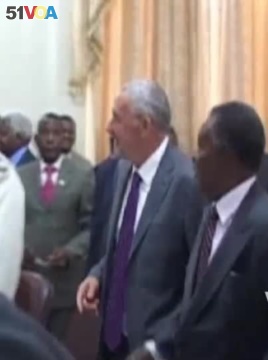October 30,2014
LUSAKA— Zambian president Michael Sata died Wednesday in London, where he had been undergoing treatment for an undisclosed illness. His death comes as the Zambian government prepares to release its final draft of a new constitution - and as Zambians reflect on 50 years of freedom from colonial rule. The southern African nation has been fairly stable for most of its life, with an economy recently classified by the World Bank as a lower-middle-income nation.
Plans to overhaul the constitution were announced shortly after Michael Sata was elected president in 2011, as part of a series of steps in his top-to-bottom review of the country's policies.

Others say the constitutional reform process has been slow to gather momentum because of a lack of consensus building from the various stakeholders.
Andrew Ntewewe is president of the Young African Leaders Initiative:
“We can do this process without political expedience. We can do this process by seeking stakeholder involvement and consensus building. We can do this process to ensure that we can have a referendum alongside the 2016 general election," said Ntewewe.
In recent years Zambia has enjoyed political stability and has annual economic growth rates of 7 percent.
But Africa's second-largest copper producer, home to 14.5 million people, is still struggling with poverty, and high unemployment. Zila Milupi, a social entrepreneur and co-founder of a nonprofit organization called “Winners Circle” says young Zambians have a role to play in solving the unemployment problem.
“I think that if young people take the bull by the horns and start to believe actually in the potential that they have, if we start to be more open-minded and if we start to foster creativity and risk taking, I think if we make deliberate efforts to do those things and to really cultivate an entrepreneurship culture, I think that there really could be a significant growth sector for Zambia," said Milupi.
To get a sense of what Zambians think about their 50th independence anniversary, VOA spoke to a couple of residents on the streets of the capital, Lusaka.
"After our independence, we have had a lot of rural-urban migration so the towns now are full of people; unemployed and employed. The economy has changed, we have developed to a certain extent, but we have not reached where we are supposed to be in 50 years," said one.
"We have enjoyed peace; we have enjoyed harmony, and a lot of good things. A long time ago, people never used to travel safely. There were limitations and now we have seen to say that people have evolved," said another.
Meanwhile, Zambia’s sometimes-rocky relationship with China is now steadily growing. A drive through Lusaka and other cities shows a country on the move, with huge Chinese infrastructure projects spurring development.